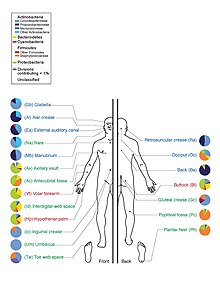廣告!!
你有在用「腦」嗎?大腦是人體中最重要的器官之一,它控制了我們的記憶、知覺以及喜怒哀樂等所有情緒,但許多人的表現卻常常讓人以為他們根本沒在用腦。但即使你真的完全沒用到我們頭頂著的這顆大腦,你一定也有用到身體裡的另一顆隱藏大腦,這第二顆大腦同樣控制著腦部的各種情緒變化,而這個器官就是我們的「腸道」。
你有在用「腦」嗎?大腦是人體中最重要的器官之一,它控制了我們的記憶、知覺以及喜怒哀樂等所有情緒,但許多人的表現卻常常讓人以為他們根本沒在用腦。但即使你真的完全沒用到我們頭頂著的這顆大腦,你一定也有用到身體裡的另一顆隱藏大腦,這第二顆大腦同樣控制著腦部的各種情緒變化,而這個器官就是我們的「腸道」。
 但是「腸道」到底何德何能可以跟大腦相提並論呢?其實在我們的身體裡有兩個分布最多神經細胞的器官,他們都會刺激身體分泌激素。其中一個是我們熟知的大腦,處理資訊較為複雜的中央神經系統,另一個就是腸道!它組成的腸道神經系統也會影響神經傳導物質的分泌。
但是「腸道」到底何德何能可以跟大腦相提並論呢?其實在我們的身體裡有兩個分布最多神經細胞的器官,他們都會刺激身體分泌激素。其中一個是我們熟知的大腦,處理資訊較為複雜的中央神經系統,另一個就是腸道!它組成的腸道神經系統也會影響神經傳導物質的分泌。
如果說大腦是一台iPhone,可以處理各種大小事,那腸道就是Apple watch,連結iPhone並協助處理周邊資訊。腸道的神經細胞數量僅次於大腦,一般而言,控制腸道神經的關鍵,就在於腸道內的上千種細菌。
 許多國際科學研究已發現,腸道內不同的微生物(又稱腸道菌叢),可能會刺激到不同的神經,神經則會再促使身體分泌出不同的物質來改善身體。而且不只能改善生理代謝,還有一些特殊的「快樂益生菌」,也被證實可以改善我們的情緒。
許多國際科學研究已發現,腸道內不同的微生物(又稱腸道菌叢),可能會刺激到不同的神經,神經則會再促使身體分泌出不同的物質來改善身體。而且不只能改善生理代謝,還有一些特殊的「快樂益生菌」,也被證實可以改善我們的情緒。 舉例來說,當我們吃下一種特定菌株-名為PS128的快樂益生菌時,腸道就會像接到指令一樣,傳送一個命令給大腦,要它分泌使人心情愉悅的血清素(Serotonin)與多巴胺(Dopamine),讓我們降低壓力與緊張,對於憂鬱症、自閉症等神經相關疾病都可能有改善。這過程就像是電影「腦筋急轉彎」裡的腦波控制團隊,一個動作,就能讓你從憂憂變成樂樂喔。
舉例來說,當我們吃下一種特定菌株-名為PS128的快樂益生菌時,腸道就會像接到指令一樣,傳送一個命令給大腦,要它分泌使人心情愉悅的血清素(Serotonin)與多巴胺(Dopamine),讓我們降低壓力與緊張,對於憂鬱症、自閉症等神經相關疾病都可能有改善。這過程就像是電影「腦筋急轉彎」裡的腦波控制團隊,一個動作,就能讓你從憂憂變成樂樂喔。
From Wikipedia, the free encyclopedia
For other uses, see Microbiota (disambiguation).
A microbiota is "the ecological community of commensal, symbiotic and pathogenicmicroorganisms that literally share our body space".[1][2] Joshua Lederberg coined the term, emphasising the importance of microorganisms inhabiting the human body in health and disease. Many scientific articles distinguish microbiome and microbiota to describe either the collective genomes of the microorganisms that reside in an environmental niche or the microorganisms themselves, respectively.[3][4][5] However, by the original definitions these terms are largely synonymous.
The human body contains over 10 times more microbial cells than human cells, although the entire microbiome only accounts for about for 1-3% total body mass,[6] with some weight-estimates ranging as high as 3 pounds (approximately 48 ounces or 1,400 grams). Research into the role that microbiota in the gut might play in the human immune system started in the late 1990s.[7] The microbiome of the gut has been characterised as a "forgotten organ",[8] and the possibility has been raised that "the mammalian immune system, which seems to be designed to control microorganisms, is in fact controlled by microorganisms".[9] The human microbiome may have a role in auto-immune diseases like diabetes, rheumatoid arthritis,muscular dystrophy, multiple sclerosis, fibromyalgia, and perhaps some cancers.[10] A poor mix of microbes in the gut may also aggravate common obesity.[11][12][13] Since some of the microbes in the human body can modify the production of neurotransmitters known to occur in the brain, it[clarification needed] may also relieve schizophrenia, depression, bipolar disorder and other neuro-chemical imbalances.[14]
The microbes being discussed are generally non-pathogenic (they do not cause disease unless they grow abnormally); they exist in harmony and symbiotically with their hosts.[15] Moreover, it has been stated that microbiome and host emerged as a unity along evolution by a process of integration.[16]



沒有留言:
張貼留言